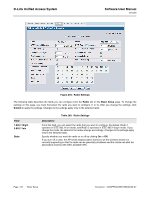D-Link DWS-4026 Product Manual - Page 414
Wireless Discovery Configuration, LAN > Security > RADIUS > Server Configuration
 |
UPC - 790069325533
View all D-Link DWS-4026 manuals
Add to My Manuals
Save this manual to your list of manuals |
Page 414 highlights
D-Link Unified Access System Software User Manual 12/10/09 Table 257: Basic Wireless Global Configuration Field Description RADIUS Authentication Server Name RADIUS Authentication Server Configured Enter the name of the RADIUS server used for AP and client authentications when a networklevel RADIUS server is not defined on the Basic Setup > SSID > Wireless Network Configuration page. The name can contain up to 32 alphanumeric characters. Spaces, underscores, and dashes are also permitted. The switch acts as the RADIUS client and performs all RADIUS transactions on behalf of the APs and wireless clients. Indicates whether the RADIUS authentication server is configured. To configure RADIUS server information, go to LAN > Security > RADIUS > Server Configuration. RADIUS Accounting Server Name Enter the name of the RADIUS server used for reporting wireless client associations and disassociations when a network-level RADIUS accounting server is not defined on the Basic Setup > SSID > Wireless Network Configuration page. The name can contain up to 32 alphanumeric characters. Spaces, underscores, and dashes are also permitted. RADIUS Accounting Server Configured Indicates whether the RADIUS accounting server is configured. To configure RADIUS accounting server information, go to LAN > Security > RADIUS > Accounting Server Configuration. RADIUS Accounting Country Code Select this option to enable RADIUS accounting for wireless clients. Select the country code that represents the country where your switch and APs operate. When you click Submit, a pop-up message asks you to confirm the change. Wireless regulations vary from country to country. Make sure you select the correct country code so that your WLAN system complies with the regulations in your country. Note: Changing the country code disables and re-enables the switch. Any channel and radio mode settings that are invalid for the regulatory domain are reset to the default values. The country code (IEEE 802.11d) is transmitted in beacons and probe responses from the access points. WIRELESS DISCOVERY CONFIGURATION The Unified Switch can discover, validate, authenticate, or monitor the following system devices: • Peer wireless switches • APs • Wireless clients • Rogue APs • Rogue wireless clients The Unified Switch can discover peer wireless switches and APs regardless of whether these devices are connected to each other, located in the same Layer 2 broadcast domain, or attached to different IP subnets. You can enable discovery between the switch and peer switches or APs by using one of following four mechanisms: 1 Manually add the IP address of the switch to the AP when it is in Standalone mode. 2 Configure a DHCP server to include the switch IP address in the DHCP response to the AP DHCP client request. 3 Use VLANs to broadcast the L2 Wireless Device Discovery Protocol. 4 Manually add the IP address of the AP to the switch. Page 414 Basic Setup Document 34CSFP6XXUWS-SWUM100-D7















